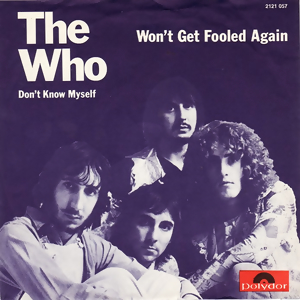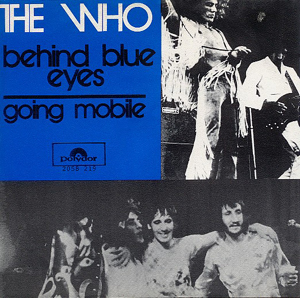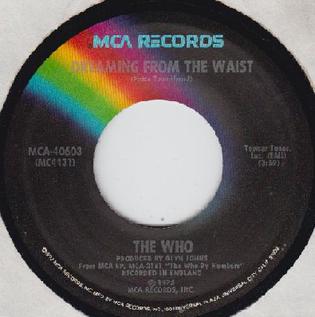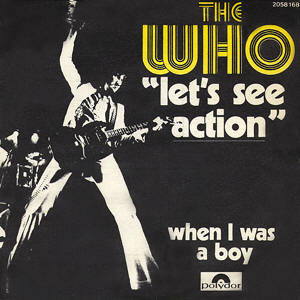Related Research Articles

The Who are an English rock band formed in London in 1964. Their classic lineup consisted of lead singer Roger Daltrey, guitarist and singer Pete Townshend, bass guitarist and singer John Entwistle, and drummer Keith Moon. They are considered one of the most influential rock bands of the 20th century, and have sold over 100 million records worldwide. Their contributions to rock music include the development of the Marshall Stack, large PA systems, the use of the synthesizer, Entwistle and Moon's influential playing styles, Townshend's feedback and power chord guitar technique, and the development of the rock opera. They are cited as an influence by many hard rock, punk rock and mod bands, and their songs are still regularly played.

Peter Dennis Blandford Townshend is an English musician, singer and songwriter. He is co-founder, leader, guitarist, secondary lead vocalist and principal songwriter of the Who, one of the most influential rock bands of the 1960s and 1970s.

Who's Next is the fifth studio album by English rock band the Who. It developed from the aborted Lifehouse project, a multi-media rock opera written by the group's guitarist Pete Townshend as a follow-up to the band's 1969 album Tommy. The project was cancelled owing to its complexity and to conflicts with Kit Lambert, the band's manager, but the group salvaged some of the songs, without the connecting story elements, to release as their next album. Eight of the nine songs on Who's Next were from Lifehouse, the lone exception being the John Entwistle-penned "My Wife". Ultimately, the remaining Lifehouse tracks would all be released on other albums throughout the next decade.

"Baba O'Riley", also erroneously referred to as its chorus refrain "Teenage Wasteland", is a song by the English rock band the Who and the opening track to their studio album Who's Next. It was issued in Europe as a single on 23 October 1971, coupled with "My Wife".

"Won't Get Fooled Again" is a song by the English rock band the Who, written by Pete Townshend. It was released as a single in June 1971, reaching the top 10 in the UK, while the full eight-and-a-half-minute version appears as the final track on the band's 1971 album Who's Next, released that August.

Who Came First is the debut album by Pete Townshend, released in 1972 on Track Records in the UK and Track/Decca in the US. It includes demos from the aborted concept album Lifehouse, part of which became Who's Next. The original release had a gatefold cover and included a poster with additional photos of Meher Baba from the Louis van Gasteren film Beyond Words. The cover photo of Townshend standing on eggs is a reference to the eternal question "Who came first: the chicken or the egg?" It peaked at number 30 on the UK album chart and at number 69 on the US Billboard 200.

"Going Mobile" is a song written by Pete Townshend and originally released by the Who on their 1971 album Who's Next. It was originally written for Townshend's abandoned Lifehouse project, with lyrics celebrating the joy of having a mobile home and being able to travel the open road. The Who's lead singer Roger Daltrey did not take part in the recording of the song, leaving the rest of the band to record it as a power trio; Townshend handles the lead vocals, guitars, and synthesizers, with John Entwistle on bass guitar and Keith Moon on drums. The song has attracted mixed reviews from music critics.

"5:15" is a song written by Pete Townshend of British rock band The Who. Part of the band's second rock opera, Quadrophenia (1973), the song was also released as a single and reached No. 20 on the UK Singles Chart, while the 1979 re-release reached No. 45 on the Billboard Hot 100.

"Love, Reign o'er Me", subtitled "Pete's Theme", is a song by English rock band The Who. Written and composed by guitarist Pete Townshend, it was released on 27 October 1973 as the second single from the band's sixth studio album and second rock opera, Quadrophenia. It is the final song on the album, and has been a concert staple for years. The song peaked at number 76 on the US Billboard Hot 100 and number 54 on Cash Box.
"The Song Is Over" is a song by the English rock band the Who, appearing on Who's Next. It was originally to be the ending song on Lifehouse. It takes place after the police invade the Lifehouse Theatre and the concert goers disappear.
"Getting in Tune" is a song written by Pete Townshend and originally released by the Who on their 1971 album Who's Next. It was originally written as part of Townshend's abandoned Lifehouse project. Its lyrics describe the power of music, as well as reflect the inner contradictions Townshend was feeling at the time between his spiritual needs and his persona as a rock star. The music incorporates a number of changes in tempo and has been praised by critics for its use of dynamics.

"Slip Kid" is a song from The Who's seventh album, The Who by Numbers. Written originally for Pete Townshend's shelved Lifehouse rock opera, "Slip Kid" was revived in 1975. The song was originally written as a warning about the music business, though Townshend has pointed out the song's relevance in different contexts. The song was released as a single in the US, backed by "Dreaming from the Waist", but failed to chart.
"Love Ain't for Keeping" is a song written by Pete Townshend and originally released by the Who on their 1971 album Who's Next. Its themes include the joy of physical love, the power of nature and the need to live for the moment.
"Drowned" is a song written by Pete Townshend, the guitarist for the Who, for their sixth album, Quadrophenia.

"Mary Anne with the Shaky Hand" is a song by the English rock band The Who. It was written by Pete Townshend and released on their 1967 album The Who Sell Out. The best known version of the song has an arrangement using acoustic guitar and Latin percussion instruments.

"Don't Let Go the Coat" is a song written by Pete Townshend and first released on The Who's 1981 album Face Dances.
"Tattoo" is a song written by Pete Townshend that was first released by The Who on their 1967 album The Who Sell Out. A "rite of passage" song, "Tattoo" tells the story of two teenaged brothers who decide to get tattoos in their attempts to become men. Themes of the song include peer pressure to conform and young men's insecurity about their manhood. The song has been heavily praised by critics and has appeared on several of The Who's live and compilation albums. It has also been covered by Tommy Keene and Petra Haden.

"Dreaming from the Waist" is a song by The Who, written by Pete Townshend and released on the group's 1975 album The Who by Numbers ; it also served as the B-side of the "Slip Kid" single, released in 1976 in the United States. The track's lyrics deal with sexual frustration and the restlessness associated with getting older, while the music features a bass solo from John Entwistle.

"It's Hard" is a song written by Pete Townshend that featured on British rock band The Who's tenth album, It's Hard, of which it was the title track. It was released as the third and final vinyl single from the album in 1983, backed with the John Entwistle written song "Dangerous", but failed to chart, although it reached number 39 on the Billboard Hot Mainstream Rock Tracks. This would become the last Who single of new material until "Real Good Looking Boy" in 2004, and the last album single by them until "Black Widow's Eyes", two years later.

"Let's See Action" is a song written and composed by Pete Townshend and recorded by the Who. It was released as a single in the UK in 1971 and reached #16 in the charts.
References
- 1 2 3 4 5 6 7 8 Maginnis, T. "Bargain". Allmusic . Retrieved 2011-11-28.
- 1 2 3 4 5 6 7 8 9 10 11 12 13 14 Grantley, S. & Parker, A.G. (2010). The Who by Numbers. Helter Skelter Publishing. p. 92. ISBN 978-1-905139-26-2.
- 1 2 3 4 5 6 7 8 9 Charlesworth, C. (1995). The Complete Guide to the Music of The Who. Omnibus Press. pp. 42–43, 120. ISBN 0-7119-4306-0.
- 1 2 3 4 5 Atkins, J. (2000). The Who on record: a critical history, 1963–1998. McFarland. pp. 154, 159. ISBN 978-0-7864-0609-8.
- 1 2 Mendelsohn, J. (January 22, 1997). "Who's Next". Rolling Stone . Retrieved 2011-11-28.
- ↑ Swenson, J. (1983). Marsh, D.; Swenson, J. (eds.). The New Rolling Stone Record Guide . Rolling Stone Press. p. 544. ISBN 0-394-72107-1.
- ↑ Unterberger, R. "Who's Missing". Allmusic . Retrieved 2011-11-28.
- ↑ Unterberger, R. "Thirty Years of Maximum R&B". Allmusic . Retrieved 2011-11-28.
- ↑ Erlewine, S.T. "The Ultimate Collection". Allmusic . Retrieved 2011-11-28.
- ↑ Erlewine, S.T. "Scoop". Allmusic . Retrieved 2011-11-28.
- ↑ Jurek, T. "The Lifehouse Chronicles". Allmusic . Retrieved 2011-11-28.